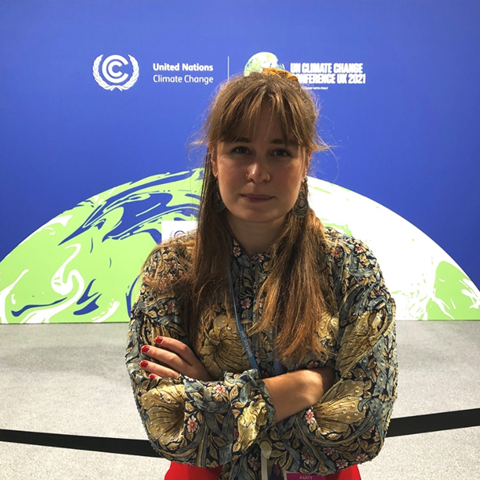SLU-student represents Swedish youth at COP26

Today you have the chance to take part in an interview with Amanda, first published at the Instagram account slu.student. Amanda is studying to be an agronomist at SLU and she has got the great honour to represent Sweden's young people at the UN climate conference in Glasgow! 🌍
Hi Amanda! Tell me, what are you doing at COP26?
I will be present throughout COP26 as part of the Swedish sharp delegation. Sweden has two youth places in the official delegation, which is appointed by LSU. To prepare for the meeting, my colleague Fredrika Andersson and I have met various youth organizations and networks to get an idea of what issues Sweden's young people want to pursue during COP26. We have also developed young people's "red lines", which become a marker for how young people approach various negotiation issues.
How did your climate commitment start?
I actually do not really remember how it started, but I have always cared a lot about nature and spent a lot of time in the woods. On the other hand, I remember how, in primary or middle school, I began to understand the threat that we humans actually pose to our planet and the unreasonableness of us also destroying ourselves. Then I also realized that based on my privileged position, for example the fact that I could choose my own education, I wanted to do what I could to reverse that development. When I then wrote my high school thesis about how large-scale cultivation of pineapple in Central America affects both workers and the surrounding environment, it became even clearer to me how climate issues are so closely linked to justice issues. From there, it was not a long step to start studying to be an agronomist.
Has your education as an agronomist contributed to you gaining a broader knowledge of the climate?
I really think that my education as an agronomist has helped me a lot. Both in the form of pure knowledge about climate change, natural resource management and ecology as well as the power factors, systems and injustices that surround production and different types of natural resource management. I feel that I have gained many perspectives that help me see the complexity of issues and the ability to weigh in both global and local aspects.
What are your top tips for living more climate-smart?
My best tip is to both make lifestyle changes and commit to a structural change. There is a lot we as individuals can do: review how we travel, what we consume, what food we eat and what our savings look like. My tip is to think about what is important to you. Is it about climate and greenhouse gas emissions? Biodiversity? Local ecosystems? The important thing is that we all do something. But I also think it is important to point out that what we do as individuals is not enough. We need structural change and decisions at a higher political level. Therefore, my second tip for living more climate-smart is to use your democratic voice and influence political decision-makers and the business community.